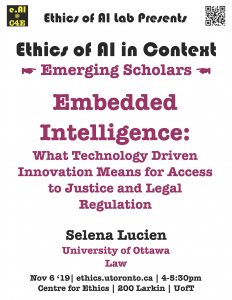
Embedded Intelligence: What Technology Driven Innovation Means
for Access to Justice and Legal Regulation
The legal world is changing. In recent years, Canada has witnessed the
proliferation of private innovative technologies that are transforming
the relationship between law and society. Technology is reconfiguring
the methods of traditional practice by giving rise to new forms of
legal service delivery. Access to justice is a growing collective
focus for the public, government, regulators, bar associations,
researchers and educators. It is also within this context that it has
been suggested that certain problems plaguing the legal system could
be addressed if it were to embrace and harness the power of
technology.
The interesting upshot of this techno-legal collision is
that the meaning of access to justice is being co-transformed through
the computational perspective of law. Access to justice problems have
influenced the design and purpose of various technologies, and the
technologies have transformed society’s perception and expectation of
justice through streamlining and simplifying the legal system. As
such, the criteria for improving access to justice are shaped by the
technological concerns, and the criteria for effective technology are
being shaped by access to justice problems, in a process of mutual
construction. Although much research has focused on how technological
innovation in the delivery of legal services can improve access to
justice, there is paucity of discussion around the ethical
implications of using technical tools to address social and political
problems. The presentation aims to explore how technology is
transforming the relationship between people, the legal system, and
the access to justice problem.
☛ please register here
Selena Lucien
University of Ottawa
Law
Selena Lucien was a Studio [Y] Innovation Fellow at MaRS Discovery District, where she founded the Small Claims Wizard to facilitate and simplify access to the Ontario Small Claims Court. Her venture was presented at Stanford Law School’s CodeX and incubated at the Legal Innovation Zone. During law school, Selena wrote a memorandum to the Minister of Foreign Affairs that outlines guiding principles to help construct policies to govern the ethical design and regulation of autonomous vehicles. She presented her findings at the Global Affairs Canada’s A.I and Human Rights Symposium. As a Technoship Fellow at University of Ottawa, Faculty of Law, she worked on a project funded by the PPOCIR to explore how artificial intelligence can facilitate access to legal information and empower consumers to be educated about their rights. She has co-authored a published encyclopedia series on innovative business and has written for the Canadian Bar Association’s The National. Selena received her graduate degree from the London School of Economics and was a recipient of the Alex Trebek Innovation Award. Selena is currently completing her articles at a leading Canadian law firm.
Wed, Nov 6, 2019
04:00 PM - 05:30 PM
Centre for Ethics, University of Toronto
200 Larkin
